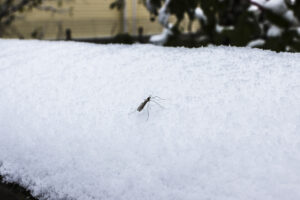
How Snow and Cold Weather Impact Mosquito Populations
Do Mosquitoes Die in Winter? The Surprising Truth
How Snow and Cold Weather Impact Mosquito Populations. When temperatures drop and snow begins to fall, many people assume that mosquitoes disappear for good. While it’s true that mosquitoes are less active in winter, they don’t completely die off—many simply go into hiding, waiting for warmer weather to return. Understanding how mosquitoes survive cold weather can help you prepare for mosquito season before it starts.
🦟 How Do Mosquitoes Survive Cold Weather?
Mosquitoes are cold-blooded insects, meaning their body temperature is regulated by their environment. As temperatures drop below 50°F, mosquitoes become inactive, and many species enter a state called diapause—a form of hibernation that helps them survive harsh winter conditions.
Here’s how different mosquito species survive the winter:
✔ Eggs: Some mosquito species lay eggs in frozen water, where they remain dormant until the ice melts in spring. Once the temperatures rise, these eggs hatch, leading to a sudden mosquito boom.
✔ Larvae & Pupae: Some mosquitoes overwinter as larvae in protected, unfrozen water sources such as underground drains, ponds, or tree holes.
✔ Adult Mosquitoes: Certain species, like the Culex mosquito, find shelter in warm, dark places such as basements, storm drains, or animal burrows, where they wait for spring.
🌡️ Why a Mild Winter Means More Mosquitoes in Spring
Warmer winters mean more mosquitoes. When temperatures remain mild, fewer mosquitoes die off, and they emerge earlier and in greater numbers when spring arrives.
Factors that contribute to a higher mosquito population in spring:
- Less Snow & Ice: If winter isn’t cold enough to kill mosquito eggs, more will hatch when temperatures rise.
- Early Thaws: Mosquito eggs laid in standing water will hatch as soon as the ice melts.
- Moisture Retention: Snowmelt and winter rain create ideal breeding grounds, providing standing water for mosquito larvae to thrive.
This is why it’s essential to take preventative action before mosquito season begins—so you’re not overwhelmed by swarms as soon as the weather warms up.
🛡️ How to Prepare for Mosquito Season During Winter
Since mosquitoes are just waiting for the right conditions to return, winter is the perfect time to take action and reduce their numbers before they hatch.
✔ Eliminate Standing Water: Walk around your property and remove any water sources where mosquito eggs may be hiding—this includes clogged gutters, birdbaths, and flower pots.
✔ Trim Overgrown Vegetation: Mosquitoes seek shelter in tall grass and bushes, so keeping your yard maintained will give them fewer places to hide.
✔ Schedule Early Mosquito Control Treatments: Treating your yard before mosquito season starts can significantly reduce populations and prevent infestations.
👉 Schedule Your First Mosquito Treatment Before Spring!
🦟 Don’t Let Mosquitoes Ruin Your Spring – Be Proactive!
Just because mosquitoes seem to vanish in winter doesn’t mean they’re gone for good. By understanding how mosquitoes survive cold weather and taking action early, you can enjoy a mosquito-free yard when warm weather returns.
Want to learn more about mosquito habits? Check out the CDC’s guide on mosquito control: CDC Mosquito Prevention
🚀 Don’t wait until it’s too late—start preparing for mosquito season today!
For more information: Winter Pests and winterizing Your Yard

